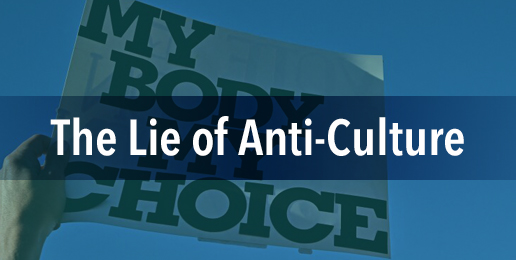
In our last couple articles, we examined two car commercials which both came out recently.
Jaguar’s ad was one of the most grotesque I’ve seen, but Volvo’s was one of the most beautiful. Take a look at those last two articles for a detailed analysis of each ad, as well as my commentary on how dangerous it is to glorify the abnormal, and how refreshing it is to glorify the normal. After all, we all live in the “normal world” created by God.
But let’s spend a little more time on this idea of “normal,” because I think it has implications beyond just gender-appropriate dress and the nuclear family. It has implications for culture in general.
One reason why people like Jaguar’s characters rebel against “molds” and the “ordinary” is because cultural norms are a sign that there’s some force outside of them telling them how to live. And their pride and self-image can’t handle that. So they begin to wage war on those bossy cultural commonalities, and then fall in with others dedicated to the same thing.
In so doing, they create an anti-culture: A community that is not so much committed to any particular norms, as it is committed to tearing down all the norms they see around them.
Yet, rebellion, idiosyncrasy, and wokeness can only last so long. If we really believed Jaguar’s ad, our dedicated mantra would be to not be defined by anything outside of us (“break moulds”), have nothing in common with anyone else (“delete ordinary”), and receive nothing from anyone else (“copy nothing”). We’d eventually spin off into toxic isolation.
This is because God has put us in a world where we are constantly defined by things outside of us.
We didn’t even pick our own name! Our sex, eye color, and height sure weren’t under our control. We were born into a society and culture that we didn’t create, learning to speak a language we didn’t invent. We were taught to live by values that we didn’t make up. And these societal norms are for our own benefit—”break moulds” sounds pretty liberating, but anyone who’s “broken the mould” of driving on the right side of the road could tell you otherwise.
So here’s one lesson our modern world desperately needs to learn: structure is a blessing, not a curse. So are rules, conventions, and culture.
Ultimately, the things that we have in common with others are what bind us together with them in community.
Biology cements families, faith cements churches, geography cements communities. So, if community is important to you, you’d better believe that the things that you have in common with others are more important than the things that make you individually unique.
On the other hand, if you don’t settle on a list of fundamental foundations that you’re going to have in common with those around you, then your best hope is to fall in with a bunch of other discontents who are commonly dedicated to overthrowing commonality. But that raises two important questions:
First, isn’t that a mold that you’re fitting yourself into? Wouldn’t that be a common core value you all share?
And then second, what will you do when you succeed? Sit there on a pink rock with your fellow discontents and all be alone together?
You might just end up being as unhappy, unhospitable, and simply unhuman as Jaguar’s androgynous TeleTubbies.
The bottom line is that culture is part of what makes us human. It allows us to commune with others. And culture means rules and structure. Culture is inescapable, because you can only defy structure for so long.
So “copy nothing” is not an option, unless you want to reinvent the entire world and then live alone in it. This is why Jaguar’s ad fails, because it is anti-culture. And it’s only a matter of time before anti-culture flies apart. So the question is not whether you are going to fit into a mold, but which mold you are going to fit into.
Yet, cultural commonality is not merely a safeguard so you will avoid spinning off into isolation. It’s not just a matter of duty or obligation—it’s a rich blessing. Culture enables us to live together in communities, and I believe that God set us up in communities so that we would have more reason to love each other.
Imagine if we didn’t have any need to live in community with each other and we were able to live completely isolated lives like Jaguar’s characters. St. Augustine once criticized those believed they could be self-sufficient and didn’t need to learn anything from others:
“Moreover, love itself, which binds men together in the bond of unity, would have no means of pouring soul into soul, and, as it were, mingling them one with another, if men never learned anything from their fellow-men.” (De Doctrina Christiana, preface, trans. James Shaw).
In other words, the need to “copy” things from others (sorry, Jaguar!) is actually a means God uses to help us love each other!
If we never depended on each other or shared anything with each other, we would have little need for love. So, cultural commonality is not just a guardrail against isolation, it is a means for creating the kind of community that manifests the kind of love God expects from us.
Maybe that’s why Jaguar’s characters looked so unhappy.
Now, this is not the only step in the argument. Step 1 is establishing the need to have a culture. But merely “having a culture” is of course not enough. Step 2 is to make sure we have the correct culture. “Normal” only works when it’s God’s normal. And of course, we’d turn directly to Scripture to sketch out what that should look like.
Accordingly, this discussion was meant to nail down just that first preliminary assumption. The characters in Jaguar’s ad aren’t likely to accept God’s normal if they are dead set on rejecting any normal whatsoever.
So, showing how anti-culture is not even an option helps us see why God-honoring culture is so important for us. It keeps us from flying off into isolation. And it provides us a powerful means to truly love each other in a community where we depend on each other.
I only hope that more ads come out like Volvo’s, glorifying the things that glorify God. I hope that people will realize we’ve had enough of anti-culture, and that we need something to hold us all together.
And ultimately, no one else can do that but the Lord.
























